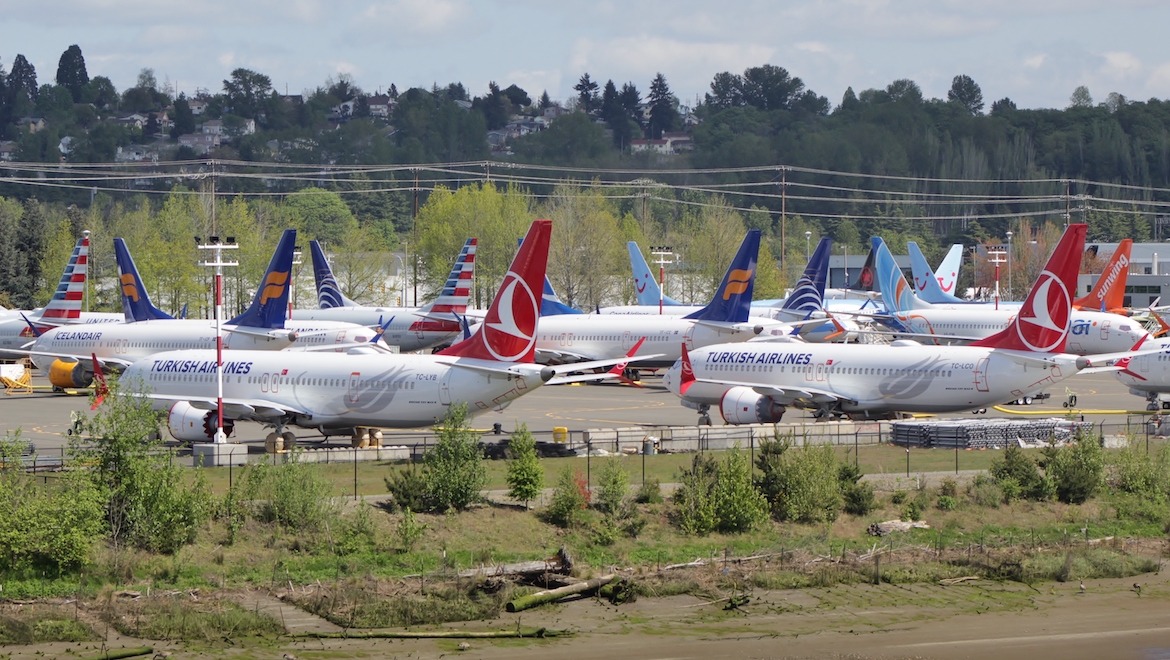
Two major credit ratings agencies have lowered their outlook for Boeing stock to negative amid the ongoing uncertainty over the return to service of the 737 MAX.
While Fitch Ratings said on Monday (US time) it had reaffirmed Boeing’s credit rating at “A/F1”, the outlook had been revised to negative, from stable previously.
“The outlook revision is based on regulatory uncertainty regarding the timing and global sequencing of the 737 MAX return-to-service (RTS),” Fitch Ratings said in a statement.
Further, the ratings agency said the decision was also based on “the growing logistical challenge of returning parked planes to service and delivering stored post-production aircraft, the substantial financing needed for temporary working capital build-up, and the risk of higher concessions to airlines, especially if the 737 MAX grounding extends into the end-of-year holiday season”.
“The MAX situation also presents significant public relations challenges, and the impact on Boeing’s reputation and brand will be a watch item for the next year or more,” the Fitch Ratings statement said.
Similarly, Moody’s Investors Service said it had reaffirmed its A2 senior unsecured and P-1 short term rating for Boeing. However, the outlook was changed to negative, from stable previously.
Moody’s senior vice president Jonathan Root said the change in outlook principally reflected the view that the global grounding of the 737 MAX would “run longer than we had expected, which will compound its operational disruption, costs and the size of the investment in working capital as production remains at a substantial rate of 42 per month”.
“The negative outlook also contemplates the execution risk in returning the narrow-body franchise to normalcy following the grounding’s end, which remains uncertain, and the timeframe for repaying the debt incurred to fund the grounding and restore confidence in the all-important MAX program, and in Boeing, more broadly,” Root said in statement on Monday (US time).
Root said potential constraints included the rate at which airlines would be able to receive 737 MAX aircraft, was well as the rate at which Boeing would be able to facilitate deliveries.
Further, there were also questions on how long it would take for regulators around the world to lift the grounding once the United States Federal Aviation Administration (FAA) gave the green light for the 737 MAX to return to the skies.
Finally, there was also the question of how quickly Boeing would be able to restore production from 42 aircraft a month currently to the pre-grounding monthly rate of 52 aircraft a month and to a previously forecast rate increase to 57 aircraft a month.
“Financial risk relative to the company’s pre-grounding profile has meaningfully increased, and the resolution and ultimate impact for Boeing, both financially and reputationally, remain unknown,” Root said.
The revisions to Boeing’s outlook from Fitch and Moody’s followed the company announcing on July 18 an after-tax charge of US$4.9 billion in its second-quarter results in relation to the grounding of the 737 MAX.
Boeing said the charge was “in connection with an estimate of potential concessions and other considerations to customers for disruptions related to the 737 MAX grounding and associated delivery delays”.
The charge would result in a US$5.6 billion reduction in revenue and pre-tax earnings for the three-months to June 30 2019.
“We are taking appropriate steps to manage our liquidity and increase our balance sheet flexibility the best way possible as we are working through these challenges,” Boeing chief financial officer Greg Smith said in a statement on July 18.
“Our multi-year efforts on disciplined cash management and maintaining a strong balance sheet, in addition to our strong and broad portfolio offerings, are helping us navigate the current environment.”
Boeing said that “for purposes of the second-quarter financial results, the company has assumed that regulatory approval of 737 MAX return to service in the US and other jurisdictions begins early in the fourth quarter 2019”.
The charge meant Boeing was projected to post the largest quarterly loss in the company’s history, according to financial analysts. It would also be the first quarterly loss in a decade.
Boeing was due to release its second-quarter results on July 24 (US time).

Regulators around the world grounded the global 737 MAX fleet following the crash of Ethiopian Airlines Flight 302 in March 2019.
Anti-stall software used on the 737 MAX, known as Maneuvering Characteristics Augmentation System (MCAS), has been implicated by investigators as a factor in the Ethiopian Airlines accident, as well as the earlier fatal crash of Lion Air Flight 610 in October 2018.
Boeing has been working on a software update on MCAS.
However, the United States Federal Aviation Administration (FAA) said in June it had found a “potential risk” with Boeing’s fix that had to be addressed before the aircraft would be cleared to fly.
“We remain focused on safely returning the 737 MAX to service,” Boeing chief executive Dennis Muilenburg said in a statement on July 18.
“This is a defining moment for Boeing. Nothing is more important to us than the safety of the flight crews and passengers who fly on our airplanes.”
Moody’s said a downgrade of Boeing’s rating “could occur if it becomes apparent that the grounding will extend into 2020 and Boeing does not reduce the production rate to conserve working capital”.
“There will be no upwards pressure on the ratings until after the MAX program returns to normal, the effects of the grounding on the business and brand are known and the financial profile restored,” Moody’s said.
“Additionally, Boeing will need to strengthen the execution of its manufacturing and quality programs across its commercial aircraft and defense manufacturing programs before Moody’s would consider upgrading its ratings.”
Similarly, Fitch said developments that may lead to a negative rating action included “material delays in returning the 737 MAX to service in some key regions beyond the end of 2019, with substantial order cancellations and related material cost increases”.
However, the ratings agency said it believed Boeing’s credit profit could support the current 737 MAX stresses “due to substantial liquidity, financial flexibility, low leverage, access to the capital markets, and revenue diversification”
“Aside from the 737 MAX, Boeing’s products and markets are healthy,” Fitch said.















